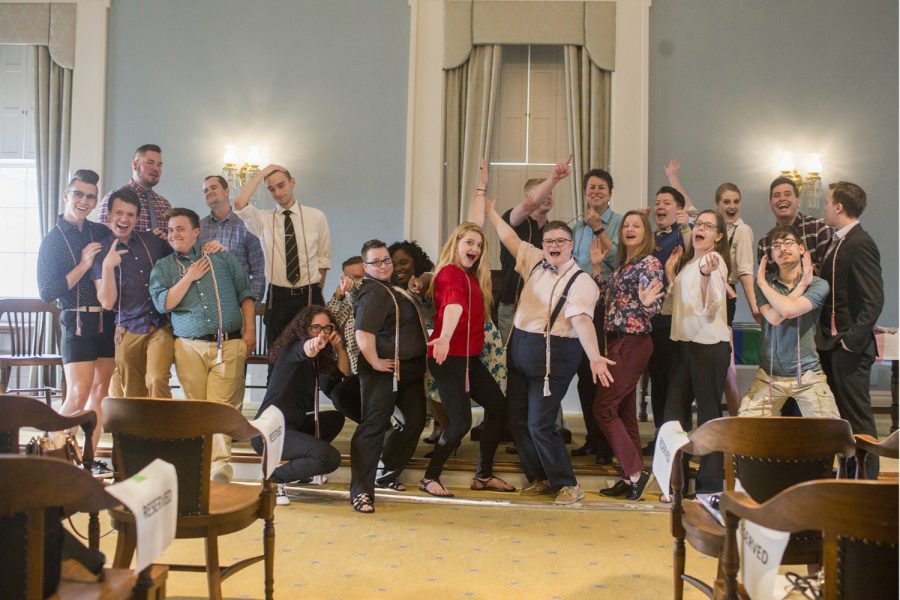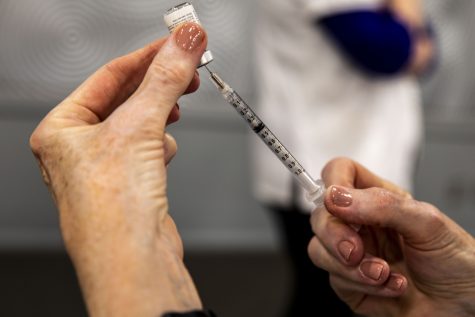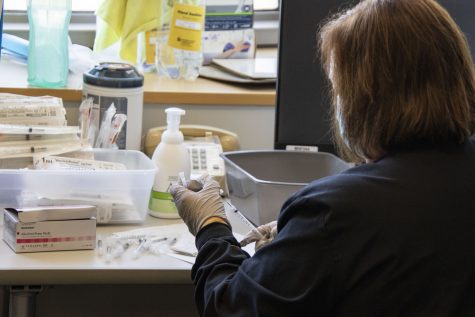UI multicultural, diversity centers explore new ways to celebrate graduating seniors amid COVID-19
Students who identify within a marginalized community may have faced added barriers to achieving their degrees, and multicultural and diversity centers across the University of Iowa campus are searching for new ways to celebrate their graduation amid the novel-coronavirus outbreak.
The Daily Iowan; Photos by Katie
All graduating seniors that participated in the Rainbow Graduation pose after the event on Tue. May 8, 2018 held in the Old Capitol Senate Chamber. The Rainbow Graduation allows LGBTQ students to celebrate their graduation as a group.
Campus coordinators are using social-media spotlights, mailed gifts, and video celebrations to highlight 2020 graduates among various identity-based University of Iowa communities after the UI canceled in-person commencement ceremonies and events.
Celebrating accomplishment is essential in the Latinx community, said Thomas Arce, coordinator for the Latino Native American Cultural Center, which facilitates cultural awareness and operates as a “home away from home” for UI students.
“That’s really the epitome of the Latinx graduation is that we’re sharing the diversity of latinidades through storytelling,” Arce said.
Arce, who chairs the Latinx graduation committee, said this academic year marks the UI’s 26th annual celebration of Latinx graduates in a formal capacity. More than 120 graduates participated in the event in spring 2019, which Arce said was the largest it’s ever been.
Because COVID-19 mitigation measures nixed an in-person Latinx graduation celebration, Arce said three different options were available to graduating seniors.
“What we decided to do is to celebrate graduates on a kind of a ‘choose your adventure,’ and the graduate can decide how they want to be recognized,” Arce said.
RELATED: Pan Asian Council issues a statement condemning anti-Asian discrimination amid COVID-19 pandemic
Students could partake in one, two, or all three of the opportunities, which include registration to receive the free gifts they would normally receive, recognition in a social-media spotlight, or announcement of their names in a congratulatory support video from the UI Latinx faculty and staff.
“Giving that recognition is important to Latinx students, and then specifically during this time of doing the remote learning in classes where students cannot share in community with each other physically, having to at least do that in some capacity virtually,” Arce said.
Arce said the celebration for Native and Indigenous graduating seniors normally occurs at the annual UI Powwow event at the Field House, and that the Native American Council is currently working to engage in a celebration online as well.
Emma Welch, coordinator of the UI Pride Alliance Center, which serves the LGBTQ IA + campus community, said COVID-19 has thrown a wrench into many different forms of student engagement, including the center’s annual Rainbow Graduation ceremony.
Welch said the ceremony normally occurs on the Tuesday of finals week in the Old Capitol Senate Chambers. Keynote speakers, alumni, and staff members partake in the ceremony and the reception that follows, Welch said.
“It’s just a great opportunity for students in the LGBTQ IA + community to be acknowledged and celebrated on a more intimate and personal level in addition to the wonderful UI larger commencement opportunities,” Welch said.
The number of graduating seniors who participate in Rainbow Graduation has increased recently, Welch said. Last spring, around 30 students participated in the event, the highest tally yet.
Welch, who has spearheaded the event amid COVID-19 mitigation measures, said graduating students could submit a video with information about them that would have otherwise been shared at the ceremony, submit a picture of themselves and a short bio for a social-media highlight to be shared during finals week, be included in a written program online, and/or be privately recognized.
“They sort of have the freedom to decide how they are celebrated,” Welch said. “We want to make sure that the students this year feel as celebrated and as appreciated as they would any other year, and we recognize that’s a grand feat and we may not accomplish that because they don’t have the opportunity to walk or travel across the stage but we’re aiming to celebrate them as much as we can.”
The center will send all of its graduates a graduation package containing either a rainbow cord or cord with the trans flag, a certificate, and a small gift, Welch said.
“Students — and especially students with marginalized identities — they work hard to get through school, and they’re given extra barriers to overcome whether that’s overt or covert barriers,” Welch said. “I strongly believe that every University of Iowa student deserves to be celebrated and deserves the spotlight and I believe that it’s vital that our affinity graduations are continuing, even if virtually.”
Stephanie Yazell, student success coach in TRIO Student Support Services, said TRIO’s annual end-of-the-year celebration was canceled. The service is a subunit of the UI Center for Diversity and Enrichment that often operates independently with grant funding to serve students who identify as first-generation, low-income, or have a documented disability.
Yazell, who has been in charge of planning the service’s end-of-year-celebration for the last two years, said graduating seniors are traditionally recognized at an event with student speeches and slideshow.
The Center for Diversity and Enrichment will hold a virtual graduation watch party, available to all center-eligible students who register for the event, from 6:30-8:30 p.m. May 13.
Many of the students TRIO Student Support Services serves will participate in the Center for Diversity and Enrichment virtual graduation, Yazell said, so the service’s team will mail out letters and gifts to its graduating students instead of having a separate ceremony as a form of congratulations.
“We want to do our best to make sure that we recognize students and show that we know that this is such a big deal for you and we want to be able to still celebrate that, even though we know it won’t be in person this year,” Yazell said.
Yazell said the federal grant that the service operates underneath allows it to serve 350 students every year. Forty-eight graduating students registered to participate in its form of celebration as of three weeks ago.
“For our students specifically, knowing that the majority of students that we serve identify as first-generation, or income-eligible, we recognize that they have faced additional barriers in life in terms of just getting to this point in life anyway,” Yazell said. “Being a first-gen student, they’re likely the first in their family to attend college, they are now the first in their family to be graduating from college, and that really is something that should be celebrated no matter what.”
(she/her/hers)
Email: [email protected]
Mary Hartel is a news reporter and digital producer at The Daily Iowan. She is a senior at the University...


















